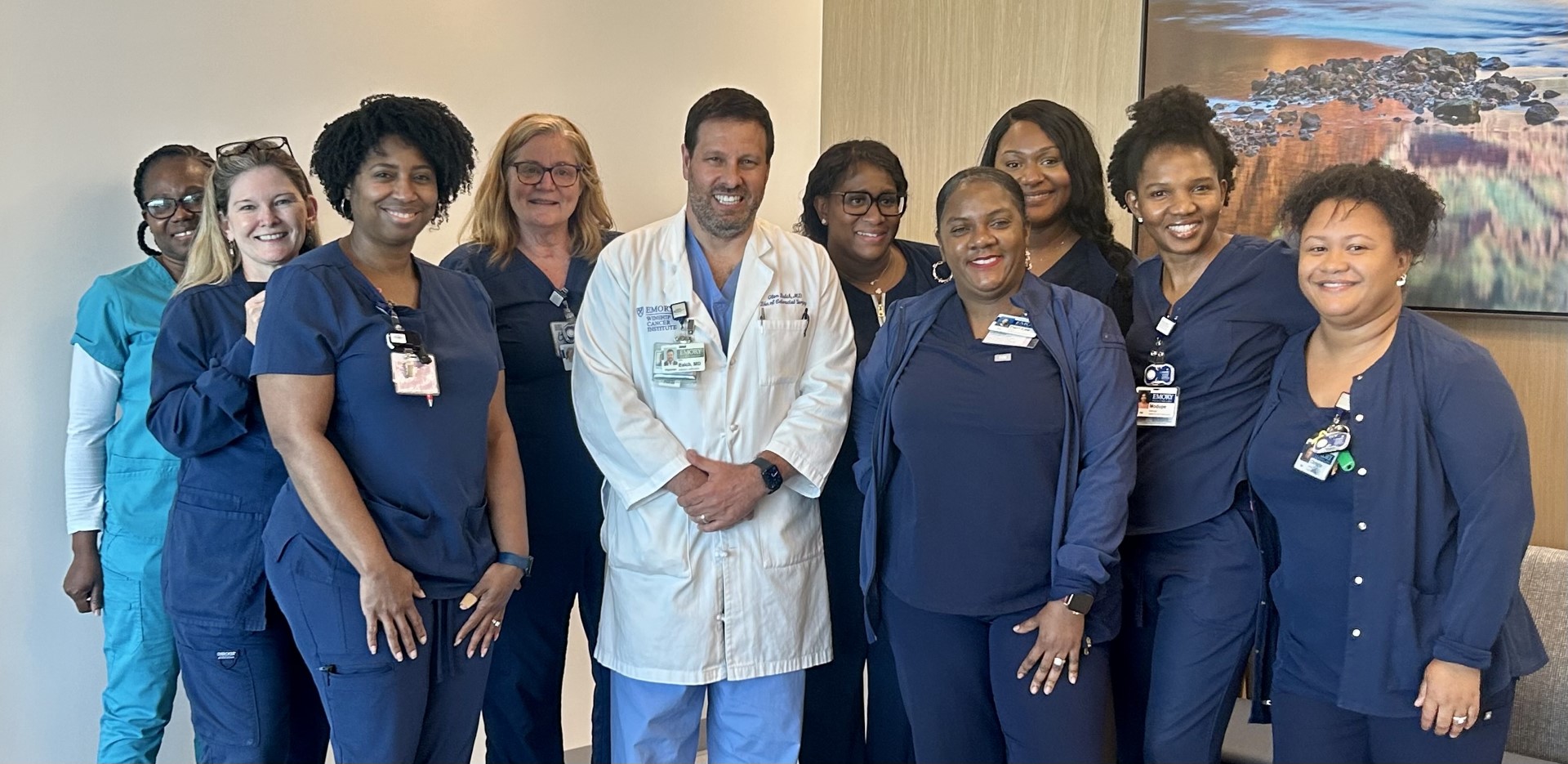Overview
Emory colorectal surgeons specialize in minimally invasive surgery and work with multidisciplinary teams that include radiologists, pathologists, pharmacists, and advanced practice nurses.
The Division of Colorectal Surgery treats patients for cancerous and non-cancerous conditions at Emory University Hospital, Emory University Hospital Midtown, Emory Saint Joseph's Hospital, and Emory Johns Creek Hospital, and also sees colon and rectal cancer patients as part of the coordinated multispecialty care provided by the Winship Cancer Institute of Emory University.
GI Conditions
The benign gastrointestinal conditions treated by the Division's versatile teams include Crohn's disease, ulcerative colitis and other types of colitis, diverticulitis, rectal prolapse, hemorrhoids, fissures, anal fistula, and all other anorectal disorders. The full spectrum of office-based and operative hemorrhoid treatments are also available, including rubber band ligation, infrared coagulation, the procedure for prolapsing hemorrhoids (PPH), Doppler-assisted hemorrhoid artery ligation (HAL), and traditional hemorrhoidectomy.
Colon Cancer
Partial colectomy is the most commonly performed colorectal cancer procedure, and involves removal of a piece of the colon or rectum with the tumor, followed by the surgeon sewing the ends back together. A section of normal tissue on either side of the tumor and local lymph nodes are also removed for pathological analysis.
Depending on the extent of the cancer, our surgeons have the expertise to perform colectomy either robotically or laparoscopically. Resection of parts of the liver, lung, or lining of the abdomen could be included, and chemotherapy may be used in combination with surgery or radiation.
Rectal Cancer
The extent and location of the particular rectal cancer often determines the surgical options. Polypectomy and local excision are done to remove superficial cancers or polyps, and generally do not involve opening the abdomen. Local transanal resection removes early Stage I rectal cancers and involves cutting through the layers of the rectal wall to remove small tumors, and also spares the abdomen.
For cancers that are higher in the rectum, our surgeons have the training and experience required to perform such technically demanding procedures as transanal endoscopic microsurgery (TEMS) and transanal minimally invasive surgery (TAMIS). Depending on the seriousness of the cancer, the Emory colorectal surgery team also offers low anterior resection, proctectomy with colo-anal anastomosis, abdominoperineal resection, and pelvic exenteration.
Inflammatory Bowel Disease
Inflammatory bowel diseases (IBD), such as Crohn disease and ulcerative colitis, are life altering conditions. Our Division has extensive experience with treatment of the full spectrum of IBD, including minimally invasive approaches to complex abdominal conditions. We also provide close multidisciplinary collaboration with gastroenterologists caring for patients with IBD. For patients requiring ostomies, we have experienced wound, ostomy, and continence nursing staff to support our patients. We also collaborate on cutting edge research in the treatment of patients with IBD.
Foundation of Quality
By subscribing to the colorectal surgery protocols of the Enhanced Recovery After Surgery (ERAS) treatment pathway, the Emory Division of Colorectal Surgery incorporates evidence-based best practices that have been shown to decrease length of stay and perioperative complications for patients who undergo colon and rectal procedures. Emory colorectal surgeon Dr. Patrick Sullivan is the medical director of the Emory-based ERAS group, working closely with the entire colorectal surgery team to optimize patient value through implementing best practices. ERAS precepts include less reliance on opioids for pain management and attempting to get patients to walk the first night after surgery.
Quality and safety initiatives of other Emory colorectal surgery faculty include Dr. Glen Balch's maintenance of accurate outcomes data for colorectal surgery procedures; Dr. Virginia Shaffer's efforts to improve communication between home health nurses and Emory clinical personnel and her work to reduce surgical site infections for patients after colorectal resection; and Dr. Seth Rosen's membership in the Cancer Prevention and Control Research Program of Winship Cancer Institute, which is dedicated to reducing cancer risk, incidence, morbidity, and mortality, and to improving the quality of life of cancer patients and survivors in Georgia and beyond.


